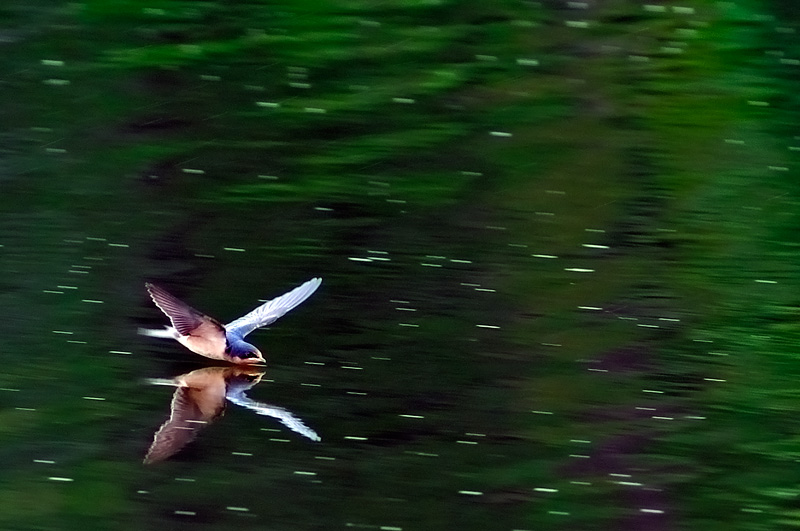Instead of scaring up a couple of ducks as I ride down the dirt path to the creek, I surprise a man standing in the middle of the stream. He is foraging in the hip deep water, but I don’t ask why. We say hello and I sit a little way upstream to watch the sunset.
Swallows are wheeling and turning under the blue skies, then diving and skimming a calm section of the stream. Quail cavort in the bushes along the stream, and pheasant squawk in the fields. Though the sun is near the horizon, it still shines with brightness and warmth.
Life is exploding around and within one. There is no division, outside or inside, even as ‘outside and inside.’ At my feet, a mother merganser with her brood of 7 new chicks swims upstream. She spots me and hurries them along. Looking beyond the stream and fields to the canyon and foothills, I see them as if for the first time.
Passive observation vies with questions for pre-eminence in the mind, but after a while the questions give way to silence and a deep reverence and affection for the earth and everything on it, including humanity. Standing after an hour, I feel something beyond words and all description. One is empty. There is, though I’m hesitant to use the word, love.
 Is the brain capable of observing without an observer? What is the observer? What part does it play in the division, conflict and fragmentation of the world and ourselves? These are crucial questions, not only for awakening the meditative state, or even for psychological health and healing, but also for ending division within and between us.
Is the brain capable of observing without an observer? What is the observer? What part does it play in the division, conflict and fragmentation of the world and ourselves? These are crucial questions, not only for awakening the meditative state, or even for psychological health and healing, but also for ending division within and between us.
The observer is the first division of the human mind, and from this mechanism all division originates. ‘Me and you;’ ‘my country and your country;’ ‘my religion and your religion.’
Thought operates in dualism. As long as thought dominates the brain and human life, war, poverty and ecological destruction will continue to rule.
At the most basic level, the observer is the separative mechanism of thought itself. Functionally, the observer has a place, and science could not be done without it. But psychologically it is inherently divisive, the basis of the illusion of a separate, permanent self, acting, and acting out from the accumulation of experience in memory and emotion.
At bottom the observer is simply thought constantly separating itself from itself in an infinite regress. In actuality, the observer is inextricably part of the entire movement of thought. The experience of being separate from what one is observing, in oneself and the world, is the core existential mistake of the human condition.
Philosophy, especially in the West, defines “observation as the process of filtering sensory information through the thought process.” That’s a good definition of the observer, not of observation. True observation begins when the observer ends, when awareness is quicker than the microsecond split thought continually makes in its own movement.
The separative mechanism within the person -–the observer —is a total impediment to direct perception. Observing only occurs when the observer is not operating.
Again, the observer is an infinite regress. It never sees itself because thought instantly and habitually removes the observer from the field of observation. Thought cannot see itself separating itself from itself, and that’s why the observer is continuously experienced as an entity apart.
There is a different, distinct capacity of the brain: for awareness and attention. Passive awareness directly perceives the program of the observer in operation, and the insight that grows out of that perception ends psychological separation.
So one can observe the observer, and catch it in the act of infinite regress. And in doing so one gains the insight that the observer is actually an inextricable part of thought. At that moment the separative trick ends, and one’s essential perceptual process is transformed.
In this process of attention, the ‘I’ doesn’t do anything, since any action of effort or will is still from the observer. Attention to the entire movement of thought, beginning with gently questioning the workings of one’s mind, ends the tremendously destructive habit of division in the mind.
Even so, the brain is so accustomed to looking in terms of the observer (having done so for tens of thousands of years) that it falls back into the habit whenever there is inattention. That’s why being mindfully aware of what one is doing, thinking and feeling in the present is so important.
Passive observation produces an intense, effortless attention. The fire of attention burns away the extraneous material of memory and emotion, releasing energy. It takes energy to release energy, but once released, the brain liberates capacities beyond imagination.
Martin LeFevre

